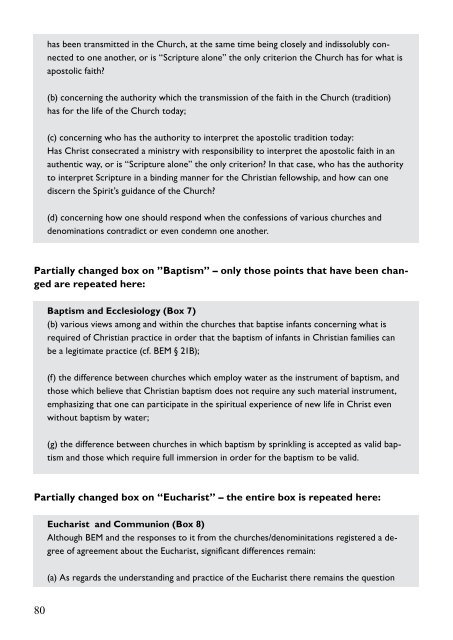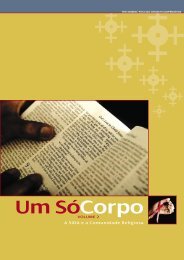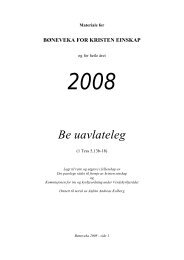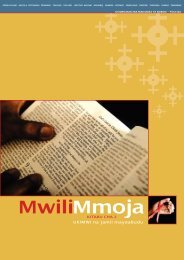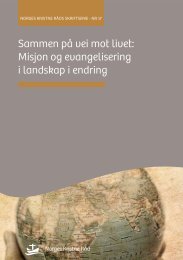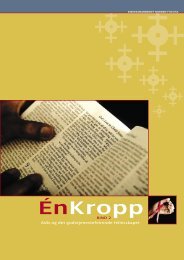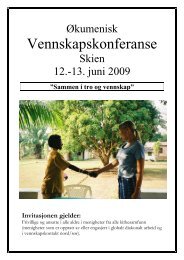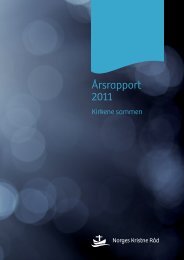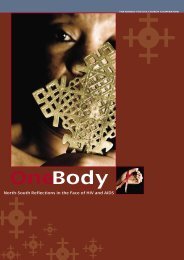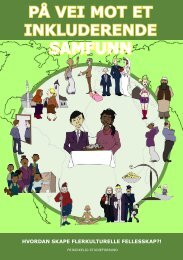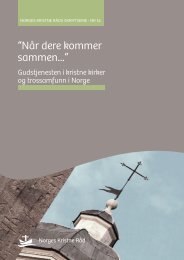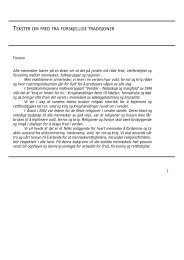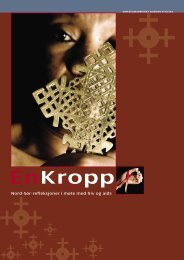Hva er kirken? To økumeniske bidrag. - Norges Kristne Råd
Hva er kirken? To økumeniske bidrag. - Norges Kristne Råd
Hva er kirken? To økumeniske bidrag. - Norges Kristne Råd
- No tags were found...
You also want an ePaper? Increase the reach of your titles
YUMPU automatically turns print PDFs into web optimized ePapers that Google loves.
has been transmitted in the Church, at the same time being closely and indissolubly connectedto one anoth<strong>er</strong>, or is “Scripture alone” the only crit<strong>er</strong>ion the Church has for what isapostolic faith?(b) conc<strong>er</strong>ning the authority which the transmission of the faith in the Church (tradition)has for the life of the Church today;(c) conc<strong>er</strong>ning who has the authority to int<strong>er</strong>pret the apostolic tradition today:Has Christ consecrated a ministry with responsibility to int<strong>er</strong>pret the apostolic faith in anauthentic way, or is “Scripture alone” the only crit<strong>er</strong>ion? In that case, who has the authorityto int<strong>er</strong>pret Scripture in a binding mann<strong>er</strong> for the Christian fellowship, and how can onedisc<strong>er</strong>n the Spirit’s guidance of the Church?(d) conc<strong>er</strong>ning how one should respond when the confessions of various churches anddenominations contradict or even condemn one anoth<strong>er</strong>.Partially changed box on ”Baptism” – only those points that have been changedare repeated h<strong>er</strong>e:Baptism and Ecclesiology (Box 7)(b) various views among and within the churches that baptise infants conc<strong>er</strong>ning what isrequired of Christian practice in ord<strong>er</strong> that the baptism of infants in Christian families canbe a legitimate practice (cf. BEM § 21B);(f) the diff<strong>er</strong>ence between churches which employ wat<strong>er</strong> as the instrument of baptism, andthose which believe that Christian baptism does not require any such mat<strong>er</strong>ial instrument,emphasizing that one can participate in the spiritual exp<strong>er</strong>ience of new life in Christ evenwithout baptism by wat<strong>er</strong>;(g) the diff<strong>er</strong>ence between churches in which baptism by sprinkling is accepted as valid baptismand those which require full imm<strong>er</strong>sion in ord<strong>er</strong> for the baptism to be valid.Partially changed box on “Eucharist” – the entire box is repeated h<strong>er</strong>e:Eucharist and Communion (Box 8)Although BEM and the responses to it from the churches/denominitations regist<strong>er</strong>ed a degreeof agreement about the Eucharist, significant diff<strong>er</strong>ences remain:(a) As regards the und<strong>er</strong>standing and practice of the Eucharist th<strong>er</strong>e remains the questionwheth<strong>er</strong> it is primarily a meal, or primarily a s<strong>er</strong>vice of thanksgiving.(b) Among the churches for whom the Eucharist is primarily a s<strong>er</strong>vice of thanksgiving, th<strong>er</strong>eis growing conv<strong>er</strong>gence conc<strong>er</strong>ning its sacrificial charact<strong>er</strong>. Remaining disagreement centresprincipally on the questions of how the sacrifice of Jesus Christ on Calvary is made presentin the eucharistic act. The biblical t<strong>er</strong>m anamnesis (memory/remembrance) has been used tounite various approaches. Howev<strong>er</strong>, some maintain that the concept has been made to bearmore weight in theological and ecumenical texts than it is capable of bearing.(c) Churches continue to disagree about the nature and mode of the presence of Christ inthe Eucharist. This is also true of the role of the Holy Spirit in the whole eucharistic celebration.(d) Th<strong>er</strong>e is disagreement conc<strong>er</strong>ning both the day on which the weekly s<strong>er</strong>vice is to takeplace and also wheth<strong>er</strong> the celebration of the Lord’s Supp<strong>er</strong> is an integrated part of thisweekly s<strong>er</strong>vice or not: For some churches, the gath<strong>er</strong>ing of the church with the preaching ofthe Word and celebration of the Lord’s Supp<strong>er</strong> on the day of the resurrection is of normativesignificance. For oth<strong>er</strong>s, questions conc<strong>er</strong>ning both the day and the content of the s<strong>er</strong>viceare of a more practical nature – for example, wheth<strong>er</strong> one should celebrate the Lord’sSupp<strong>er</strong> ev<strong>er</strong>y Sunday, or on which day the church should gath<strong>er</strong>. Some churches emphasizethe holiness of the Sabbath, the seventh day.(e) C<strong>er</strong>tain churches do not celebrate the Eucharist with bread and wine, emphasizingrath<strong>er</strong> the wordless communion of the faithful in the meeting for worship and the fact thatev<strong>er</strong>y common meal can be a sacramental, holy communion when Jesus is received andhonoured.(f) Th<strong>er</strong>e is disagreement conc<strong>er</strong>ning who can receive the Eucharist/communion. Somechurches invite all who believe in Jesus Christ to receive communion, wheth<strong>er</strong> they are baptisedor not, while oth<strong>er</strong>s invite only those who believe in Jesus Christ and are baptised andin a “state of grace”. Oth<strong>er</strong>s unconditionally invite all who are baptised.(g) All Christians do not yet share the communion. Some churches believe that eucharisticsharing is both a means of building communion between divided churches as well as thegoal of ecumenical work. Oth<strong>er</strong>s find that eucharistic sharing is not a means to Christianunity but is only a goal for ecumenical work. They th<strong>er</strong>efore off<strong>er</strong> communion to memb<strong>er</strong>sof oth<strong>er</strong> churches or allow their own memb<strong>er</strong>s to participate in the communion of oth<strong>er</strong>churches only on exception.Behind the variety of practices connected to the celebration and sharing of the Lord’sSupp<strong>er</strong> lie s<strong>er</strong>ious theological problems between the churches that are at present unresol-80 81


